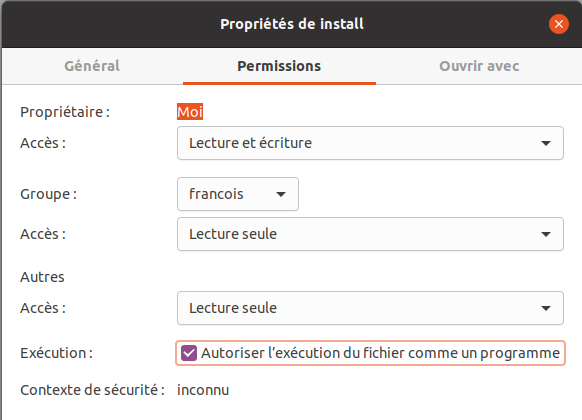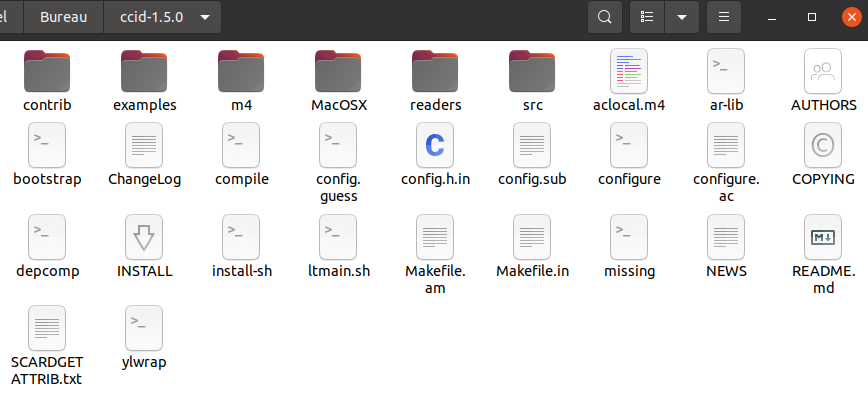Le Forum
Vous n'êtes pas identifié.
#1 18 May 2022 17:42:18
- François Marthaler
- Modérateur

- Lieu: Prilly
- Date d'inscription: 07 Sep 2013
- Messages: 2872
- Site web
Pilote Linux pour lecteur de cartes externe Cherry ST-1144
Bonjour,
Un médecin vaudois et très fidèle client de why! nous a communiqué une offre de la Caisse des Médecins pour un portable HP avec Windows 10 Pro à plus de CHF 1'000.- (plus CHF 1'000.- pour une installation complète sur site, MS Office et une prolongation de garantie) en nous demandant si why! pourrait fournir un ordinateur portable capable de faire tourner le logiciel de gestion commercialisé par la Caisse des Médecins. Malheureusement, ce dernier ne fonctionne que sur un poste Windows.
Heureusement, il existe depuis quelques temps une solution basée sur Internet utilisable avec un simple navigateur web et indépendamment du système d'exploitation. Ce médecin a donc commandé un why! N240WU avec Ubuntu 20.04 LTS et tout devrait fonctionner.
Cependant, pour fonctionner, le logiciel en ligne doit pouvoir accéder aux informations se trouvant sur la carte d'assurance maladie du patient via une lecteur de carte externe Cherry ST-1144. Malheureusement, celui-ci n'est pas reconnu par Linux de même que par Windows sans installation d'un pilote. Reste à savoir s'il existe un pilote Linux et comment l'installer...
laptop why! NV41MZ, Intel Core i7-1165G7, RAM 16 Gb, Ubuntu 22.04 LTS
Hors ligne
#2 18 May 2022 17:50:16
- François Marthaler
- Modérateur

- Lieu: Prilly
- Date d'inscription: 07 Sep 2013
- Messages: 2872
- Site web
Re: Pilote Linux pour lecteur de cartes externe Cherry ST-1144
J'ai rapidement trouvé les pilotes Linux 64 bit pour le Cherry ST-1144 sur https://cherry.de/download/de/download.php.
On y trouve un guide d'utilisation en plusieurs langues, dont le français (PDF 763 Ko), qui indique
1.2 Linux/Mac
Le logiciel actuel est disponible sur Internet à l’adresse : www.cherry.de."
Même si je n'ai pas de lecteur sous la main, je vais commencer par installer:
PC/SC driver (Release: 2018-04-26) Linux x64, x86, i686, ARM. Requirements: eglibc-2.11.3, libusb-1.0.8
Après avoir accepté la licence EULA, j'ai pu télécharger une archive omnikey_ccid_driver_for_8051_controller_based_readers_v.4.3.3.zip. Avec un double-clic sur son icône, j'ai trouvé un fichier ifdokccid_linux_x86_64-4.3.3-3-a973c36ed296.tar.gz, lui-même compacté. Après avoir décompacté ce dernier fichier sur le bureau, j'ai:
Un double-clic sur install ne donnant rien, je suis allé dans les propriétés du fichier pour autoriser son exécution comme un programme:
Mais rien ne démarre...
Voici ce que contient le fichier README.html:
------------------------------ What you need ------------------------------ [1] Kernel with USB support either compiled in or as modules [2] Mounted /usbfs (/usbdevfs) For more detailed informations see http://www.linux-usb.org/ [3] libusb >= Version 1.0.8 available at http://libusb.sourceforge.net/ [4] PCSCLite > Version 1.5.5 available at http://alioth.debian.org/projects/pcsclite/ [5] This driver supports our CT-API and our Synchronous API. So, if you like to use one of them, you must download the API in question from https://www.hidglobal.com. ------------------------------ What is new in this release ? ------------------------------ * Added support for El Capitan
------------------------------ Driver Installation ------------------------------ After you have downloaded the tarball extract it in any directory # tar -xzvf ifdokccid change to this directory and run as root user # ./install This script checks if PCSCLite is installed and then copies the CCID driver bundle to /usr/local/pcsc/drivers directory, which is the default PCSCLite USB driver dropdir. You can change the dropdir by providing another install path to the install script using the option '-d': # ./install -d /path/to/my/dropdir ------------------------------ Troubleshooting ------------------------------ - Stop the pcscd daemon # sudo killall -9 pcscd If you can just detect one of the two reader slots of the 5321 it can happen that the libccid driver catches the reader. To be sure you can start the pcsc daemon in debug mode: # sudo pcscd -fd If you plug now the reader and it detects just one slot you can fix the problem: - find out the drop dir of the drivers # sudo pcscd -v output e.g. pcsc-lite version 1.5.5. Copyright (C) 1999-2002 by David Corcoran . Copyright (C) 2001-2008 by Ludovic Rousseau . Copyright (C) 2003-2004 by Damien Sauveron . Report bugs to . Enabled features: Linux libhal usbdropdir=/usr/local/pcsc/drivers confdir=/etc ipcdir=/var/run/pcscd The path after usbdropdir shows you the dropdir of the drivers. e.g /usr/local/pcsc/drivers - change into drivers directory and list subdirectories. e.g. # cd /usr/local/pcsc/drivers # ls output e.g. ifd-ccid.bundle ifdokrfid_lnx_i686-2.8.1.bundle - change into libccid Contents directory: # cd ifd-ccid.bundle/Contents - create a backup of the current file so that you can restore it if something goes wrong # sudo cp Info.plist Info.plist.backup - add the right to write to Info.plist # sudo chmod +w Info.plist - open Info.plist in an editor your choice e.g. vi, vim, emacs, kate # sudo vi Info.plist - look for the product ID's section, it should be close to line 200. please look for 0x5321 - IMPORTANT!!! COUNT which entry it is and delete it, you need the position for the further steps - look for the vendor ID's section, it should be close to line 100. please look for the entry at same position like the product ID the entry should be 0x076B, please delete this line - look for the friendly names section, it should be close to line 300. please look for the entry at same position like the product ID the entry should be "OmniKey CardMan 5321", please delete this line - save the file and close the editor - delete the right to write to Info.plist # sudo chmod -w Info.plist - restart pcscd with sudo pcscd Now the HID OMNIKEY 5321 will be detected by the pcsc daemon ------------------------------ Note ------------------------------ 1. PCSCLite with ADD_SERIAL_NUMBER support contains a bug which prevents PCSCLite from dedecting a reader removal. Workaround: * undefine ADD_SERIAL_NUMBER in hotplug_libusb.c and recompile PCSC. 2. PCSCLite with ADD_SERIAL_NUMBER support contains a bug causes PCSCLite to crash if more than 1 reader is used. Workaround: * undefine ADD_SERIAL_NUMBER in hotplug_libusb.c and recompile PCSC. ----------------------------- Support ----------------------------- Q: What driver version am I using at the moment? A: You can determine the driver version number by having a look at the PCSCLite bundle directory (usually /usr/local/pcsc/drivers): The bundle name of our devices drivers contain the driver version number. The driver is also printing a version string every time a reader is activated by PCSCLite: This string can be found either in the system log or on the console you started PCSCLite daemon from. Q: I am experiencing problems using smartcard XYZ ! A: Please send an email to our support address eusupport@hidglobal.com containing a description of the chain of events which lead to the misbehavior (reader plug-in/-off, SC insertion/removal, commands sent to the SC or at least the program used to talk to the SC), also include the name and ATR of the smartcard, and add the PCSCLite log events (should be written to your system log /var/log/messages or similar). Your systems kernel version and kind of distribution may also be helpful.
Tout cela me semble un peu compliqué...
En effet, voici ce que j'ai trouvé en cherchant Cherry ST-1144 et Ubuntu 20.04: https://wiki.ubuntuusers.de/Smart_Cards/.
laptop why! NV41MZ, Intel Core i7-1165G7, RAM 16 Gb, Ubuntu 22.04 LTS
Hors ligne
#3 18 May 2022 18:44:52
- François Marthaler
- Modérateur

- Lieu: Prilly
- Date d'inscription: 07 Sep 2013
- Messages: 2872
- Site web
Re: Pilote Linux pour lecteur de cartes externe Cherry ST-1144
Il existe aussi une version en français du site de cherry.de. Comme pour la version allemande, il faut encore télécharger CCID driver Linux. Après décompactage, j'ai un dossier ccid-1.5.0 qui contient plusieurs choses:
Le README contient essentiellement des notes de version. Malheureusement, je dois m'arrêter là et je ne suis pas sûr qu'il ne soit pas nécessaire d'avoir le lecteur et le programme de la Caisse des Médecins pour avancer en besogne...
J'ai juste regardé dans Synaptic si j'avais:
- libusb-1.0.8 -> j'ai la version libusb-1.0-1
- eglibc-2.11.3 -> aucun eglibc
Il faudra certainement commencer par les installer...
laptop why! NV41MZ, Intel Core i7-1165G7, RAM 16 Gb, Ubuntu 22.04 LTS
Hors ligne
#4 19 May 2022 08:29:58
- claudep
- Prêcheu(r|se) du libre
- Date d'inscription: 19 May 2015
- Messages: 130
Re: Pilote Linux pour lecteur de cartes externe Cherry ST-1144
En ce qui concerne CCID, je commencerais d'abord par installer la bibliothèque inclue dans la logithèque: libccid. D'après https://ccid.apdu.fr/ccid/supported.html#0x046A0x002D, il y a de l'espoir que ça fonctionne.
Hors ligne
#5 20 May 2022 12:59:13
Re: Pilote Linux pour lecteur de cartes externe Cherry ST-1144
Bonjour,
J'ai lancé Install depuis le terminal et l'appareil m'a dit qu'il fallait installer pcsc-lite.
Pour se faire j'ai installé pcscd via le terminal toujours, puis relancé sudo ./install.sh et il m'a dit que l'installation s'était faite.
Par contre le lecteur de carte n'a pas fonctionné, pour une raison que j'ignore.
Comme je n'avais pas le lecteur de carte sous les yeux, je n'ai pas pu tous vérifier en détail.
Mais je pense que nous nous approchons du but.
laptop why! N650DU, Intel Core i7-7700T, RAM 16 Gb, Ubuntu 18.04 LTS
Hors ligne